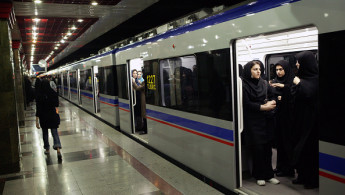Western concern grows over Iranian teen's 'intolerable' attack in Tehran metro
Western governments on Wednesday expressed concern after an alleged assault by Iranian security forces had reportedly left a teenager in a coma, with Germany's top diplomat dubbing the incident "intolerable".
A rights group also called for an international investigation into the confrontation on the Tehran metro, just over a year after the death in custody of Mahsa Amini who had been arrested for allegedly violating the strict dress rules for women.
Armita Garawand, 16, was attacked on Sunday by female police officers, according to the Kurdish-focused rights group Hengaw.
Iranian authorities have claimed she "fainted" due to low blood pressure, denying any involvement of security forces.
Iranian authorities have remained on high alert for any upsurge of social tension around and after the September 16 anniversary of Amini's death, which last year triggered months of unrest.
The nationwide protest movement had rattled Iran's clerical leadership before dwindling in the face of a crackdown that according to activists saw hundreds killed and thousands arrested.
"Once again a young woman in Iran is fighting for her life. Just because she showed her hair on the subway," German Foreign Minister Annalena Baerbock wrote on X, formerly Twitter.
"It's intolerable."
Abram Paley, the acting US special envoy on Iran, posted on X that Washington was "shocked and concerned about reports that Iran's so-called morality police have assaulted" the teenager.
"We are following news of her condition. We continue to stand with the brave people of Iran and work with the world to hold the regime accountable for its abuses," Paley added.
The case has become the subject of intense discussion on social media, with a purported video of the incident said by some to show Garawand, apparently unveiled, being pushed into the metro by police agents and then an immobile body pulled out.
Norway-based NGO Iran Human Rights urged "an independent international investigation to establish the details" of the incident, accusing Tehran of "a long history of distorting facts and concealing evidence of their crimes".
"The Islamic republic continues its harassment and repression of women under the guise of fighting mandatory hijab violations," said the group's director, Mahmood Amiry-Moghaddam.
Hengaw said that Garawand was being treated under tight security at Tehran's Fajr hospital.
It published a picture it said was of Garawand on her hospital bed, attached to a feeding tube with her head and neck heavily bandaged.
Her parents gave an interview to Iranian state media at the hospital "under considerable pressure" and "in the presence of high-ranking security officers", Hengaw said.
Baerbock said the family should not have to "be in front of cameras, but have the right to be at their daughter's bedside".
A resident of Tehran, Garawand hails from the city of Kermanshah in Iran's Kurdish-populated west, Hengaw said.
Maryam Lotfi, a journalist from the Shargh daily newspaper, sought in the aftermath of the incident to visit the hospital but was immediately detained, Hengaw said, adding she was subsequently released.





 Follow the Middle East's top stories in English at The New Arab on Google News
Follow the Middle East's top stories in English at The New Arab on Google News


